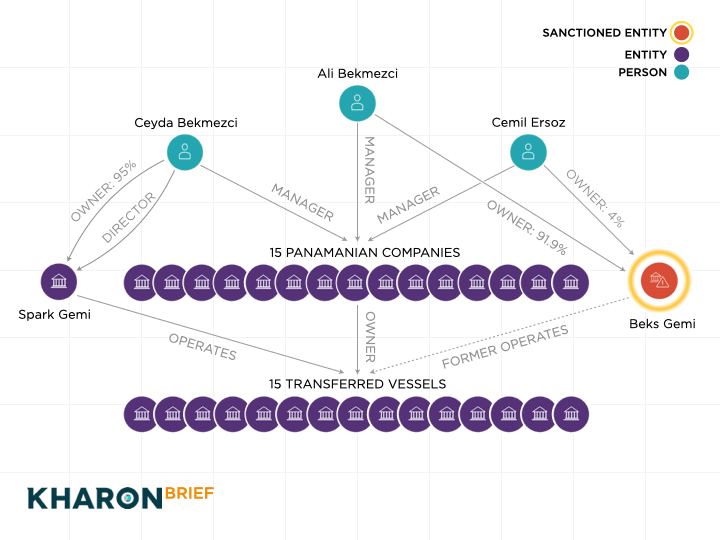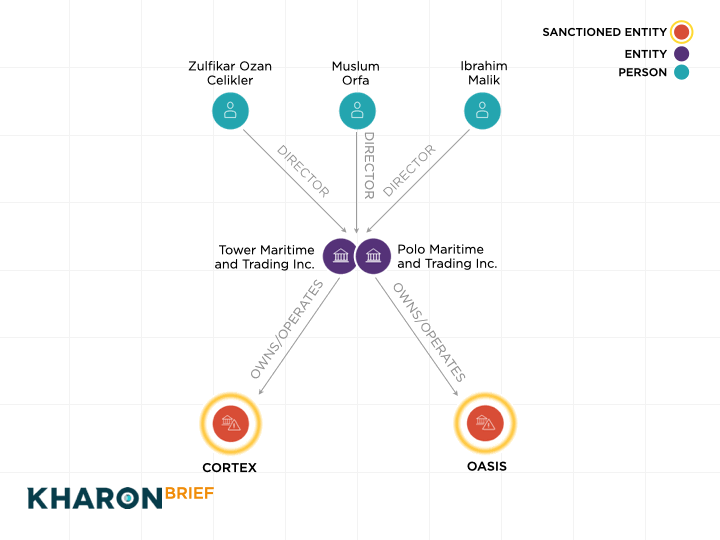Insights break down a Kharon investigation and why it matters, in 3 minutes or less.
The “shadow fleet” of oil tankers and bulk carriers that power Russia’s sanctions evasion often shuffle their listed ownership or management—a revolving door of paper-only changes that do little to alter the underlying risks, or the core network of operators.
Take the example of Beks Gemi Isletmeciligi Ve Ticaret A.S. (Beks Gemi), a Turkish vessel-management company sanctioned by the U.K. last year for its involvement in shipping Russian oil. Afterward, Beks Gemi transferred some of its vessels’ operations to a different Turkish company that remains off sanctions lists.
Both companies, a Kharon investigation found, are owned and managed by close affiliates and possible family members. And the network’s vessels continued to export Russian oil.
News to know: The EU, Canada and the U.K. expanded their sanctions on Russia’s shadow fleet last month, part of a larger escalation to constrict Russia’s oil and gas industry and to curb the transfer of drones, missiles, and related technology to Russia.
According to Bloomberg, the U.S. vetoed a G-7 proposal this month that would have established a task force to combat Russia’s shadow fleet.
Inside the network: Several Turkish nationals are at the center of the Beks Gemi network. Beks Gemi’s founders and owners include Ali Bekmezci and Cemil Ersoz. After the U.K. sanctioned Beks Gemi, in February 2024, it transferred the management of 16 vessels to Spark Gemi Isletmeciligi AS (Spark Gemi), which is owned and directed by two Turkish nationals who share the same surnames: Ceyda Bekmezci and Zehra Ebru Ersoz, demonstrating the firms’ potential interlinked leadership.
Fifteen of the former Beks Gemi ships are owned by Panamanian companies that Beks Gemi founders Ali Bekmezci and Cemil Ersoz co-manage with the majority owner of Spark Gemi, Ceyda Bekmezci.
The “shadow fleet” of oil tankers and bulk carriers that power Russia’s sanctions evasion often shuffle their listed ownership or management—a revolving door of paper-only changes that do little to alter the underlying risks, or the core network of operators.
Take the example of Beks Gemi Isletmeciligi Ve Ticaret A.S. (Beks Gemi), a Turkish vessel-management company sanctioned by the U.K. last year for its involvement in shipping Russian oil. Afterward, Beks Gemi transferred some of its vessels’ operations to a different Turkish company that remains off sanctions lists.
Both companies, a Kharon investigation found, are owned and managed by close affiliates and possible family members. And the network’s vessels continued to export Russian oil.
News to know: The EU, Canada and the U.K. expanded their sanctions on Russia’s shadow fleet last month, part of a larger escalation to constrict Russia’s oil and gas industry and to curb the transfer of drones, missiles, and related technology to Russia.
According to Bloomberg, the U.S. vetoed a G-7 proposal this month that would have established a task force to combat Russia’s shadow fleet.
Inside the network: Several Turkish nationals are at the center of the Beks Gemi network. Beks Gemi’s founders and owners include Ali Bekmezci and Cemil Ersoz. After the U.K. sanctioned Beks Gemi, in February 2024, it transferred the management of 16 vessels to Spark Gemi Isletmeciligi AS (Spark Gemi), which is owned and directed by two Turkish nationals who share the same surnames: Ceyda Bekmezci and Zehra Ebru Ersoz, demonstrating the firms’ potential interlinked leadership.
Fifteen of the former Beks Gemi ships are owned by Panamanian companies that Beks Gemi founders Ali Bekmezci and Cemil Ersoz co-manage with the majority owner of Spark Gemi, Ceyda Bekmezci.

Kharon users can explore this Insight in greater detail through the ClearView platform.
Little control appears to have changed.
Connecting the dots: The CORTEX and OASIS are two oil tankers that Ali Bekmezci and the Beks Gemi network once operated and ultimately owned. According to trade data, both ships continued to transport Russian oil after Beks Gemi’s designation, with the OASIS making port calls in Russia as recently as December.
The E.U. that month designated both vessels themselves. Afterward, Beks Gemi transferred operations of the CORTEX and OASIS to two separate Panamanian companies that share the same Turkish directors:
Connecting the dots: The CORTEX and OASIS are two oil tankers that Ali Bekmezci and the Beks Gemi network once operated and ultimately owned. According to trade data, both ships continued to transport Russian oil after Beks Gemi’s designation, with the OASIS making port calls in Russia as recently as December.
The E.U. that month designated both vessels themselves. Afterward, Beks Gemi transferred operations of the CORTEX and OASIS to two separate Panamanian companies that share the same Turkish directors:

Kharon users can explore this Insight in greater detail through the ClearView platform.
The name of one of the Panamanian companies, Tower Maritime and Trading Inc., is nearly identical to that of a company that used to be in both ships’ ownership chains: Tower and Maritime Trading Ltd. Registered in Hong Kong, it’s wholly owned by Ali Bekmezci.
Rewind: A Kharon investigation published last month detailed an oil-shipping shadow-fleet network operated by 12 interconnected companies, only one of which was sanctioned. Three weeks after the U.S. designated one of that company’s ships, the GOODWIN, it changed its name and falsified its flag to Guyana’s, Kharon found.
Takeaways: These shadow-fleet networks are constantly evolving, whether by shifting their listed owners or managers, their vessels’ names, or their jurisdictions, often to ones where beneficial-ownership information can be more opaque.
As Western governments continue to target such networks, vigilant monitoring will be vital for businesses to avoid possible sanctions violations.
Read more from Kharon:
Rewind: A Kharon investigation published last month detailed an oil-shipping shadow-fleet network operated by 12 interconnected companies, only one of which was sanctioned. Three weeks after the U.S. designated one of that company’s ships, the GOODWIN, it changed its name and falsified its flag to Guyana’s, Kharon found.
Takeaways: These shadow-fleet networks are constantly evolving, whether by shifting their listed owners or managers, their vessels’ names, or their jurisdictions, often to ones where beneficial-ownership information can be more opaque.
As Western governments continue to target such networks, vigilant monitoring will be vital for businesses to avoid possible sanctions violations.
Read more from Kharon:







